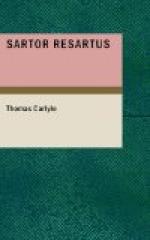We looked in his face to see whether, in the utterance of such extraordinary Night-thoughts, no feeling might be traced there; but with the light we had, which indeed was only a single tallow-light, and far enough from the window, nothing save that old calmness and fixedness was visible.
These were the Professor’s talking seasons: most commonly he spoke in mere monosyllables, or sat altogether silent and smoked; while the visitor had liberty either to say what he listed, receiving for answer an occasional grunt; or to look round for a space, and then take himself away. It was a strange apartment; full of books and tattered papers, and miscellaneous shreds of all conceivable substances, “united in a common element of dust.” Books lay on tables, and below tables; here fluttered a sheet of manuscript, there a torn handkerchief, or nightcap hastily thrown aside; ink-bottles alternated with bread-crusts, coffee-pots, tobacco-boxes, Periodical Literature, and Blucher Boots. Old Lieschen (Lisekin, ’Liza), who was his bed-maker and stove-lighter, his washer and wringer, cook, errand-maid, and general lion’s-provider, and for the rest a very orderly creature, had no sovereign authority in this last citadel of Teufelsdrockh; only some once in the month she half-forcibly made her way thither, with broom and duster, and (Teufelsdrockh hastily saving his manuscripts) effected a partial clearance, a jail-delivery of such lumber as was not Literary. These were her Erdbeben (earthquakes), which Teufelsdrockh dreaded worse than the pestilence; nevertheless, to such length he had been forced to comply. Glad would he have been to sit here philosophizing forever, or till the litter, by accumulation, drove him out of doors: but Lieschen was his right-arm, and spoon, and necessary of life, and would not be flatly gainsayed.




